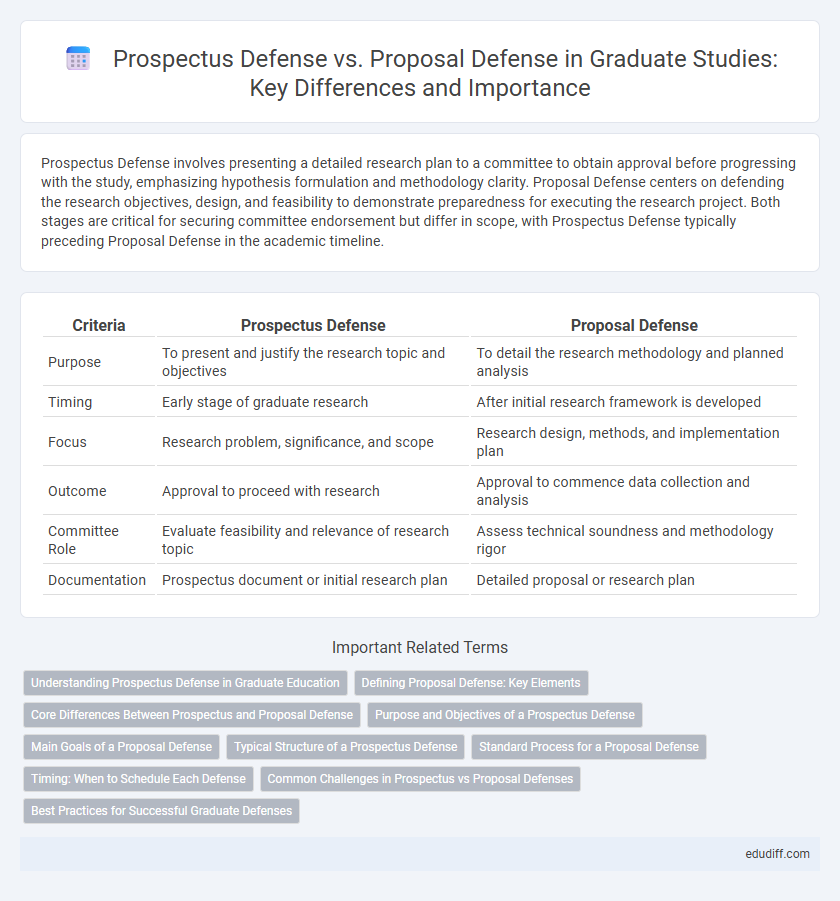Prospectus Defense involves presenting a detailed research plan to a committee to obtain approval before progressing with the study, emphasizing hypothesis formulation and methodology clarity. Proposal Defense centers on defending the research objectives, design, and feasibility to demonstrate preparedness for executing the research project. Both stages are critical for securing committee endorsement but differ in scope, with Prospectus Defense typically preceding Proposal Defense in the academic timeline.
Table of Comparison
| Criteria | Prospectus Defense | Proposal Defense |
|---|---|---|
| Purpose | To present and justify the research topic and objectives | To detail the research methodology and planned analysis |
| Timing | Early stage of graduate research | After initial research framework is developed |
| Focus | Research problem, significance, and scope | Research design, methods, and implementation plan |
| Outcome | Approval to proceed with research | Approval to commence data collection and analysis |
| Committee Role | Evaluate feasibility and relevance of research topic | Assess technical soundness and methodology rigor |
| Documentation | Prospectus document or initial research plan | Detailed proposal or research plan |
Understanding Prospectus Defense in Graduate Education
Prospectus Defense in graduate education serves as a critical milestone where students present their research plan to a committee for approval before proceeding with their thesis or dissertation. This defense emphasizes the feasibility, significance, and methodology of the proposed study, ensuring alignment with academic standards and research objectives. Unlike Proposal Defense, which may have a broader scope, Prospectus Defense specifically addresses the research's conceptual framework and preliminary literature, guiding students toward a focused and viable project.
Defining Proposal Defense: Key Elements
Proposal Defense involves presenting a detailed research plan outlining objectives, methodology, and significance before a committee to gain approval for the study. Key elements include a clear statement of the research problem, a comprehensive literature review, and a well-structured methodology demonstrating feasibility. The focus on justification and expected contributions ensures alignment with academic standards and research goals.
Core Differences Between Prospectus and Proposal Defense
Prospectus defense primarily involves presenting a research plan to a committee for approval, emphasizing the significance and feasibility of the proposed study. Proposal defense requires detailing the research methodology, data collection, and analysis techniques, ensuring the project's execution is sound and well-structured. The core difference lies in prospectus defense centering on the study's conceptual framework and rationale, whereas proposal defense focuses on the practical implementation of the research design.
Purpose and Objectives of a Prospectus Defense
Prospectus Defense aims to demonstrate the feasibility and significance of the research project, outlining clear objectives, methodology, and expected contributions to the field. Its purpose is to secure approval from the graduate committee by proving that the proposed study is well-planned and academically rigorous. The defense ensures alignment between research goals and academic standards, setting a roadmap for successful thesis completion.
Main Goals of a Proposal Defense
The main goals of a proposal defense are to demonstrate the feasibility and significance of the research project, clarify the research questions and methodology, and obtain constructive feedback from faculty experts. It serves to confirm the candidate's understanding of the theoretical framework and aligns the research plan with academic standards and ethical guidelines. Successful proposal defense ensures that the study is well-designed and ready for execution, paving the way for a comprehensive and focused prospectus defense.
Typical Structure of a Prospectus Defense
The typical structure of a prospectus defense includes a clear presentation of the research problem, objectives, and significance, followed by a detailed methodology section outlining data collection and analysis plans. Graduate students must also demonstrate a thorough literature review to establish the academic context and justify their research approach. The defense concludes with anticipated challenges, ethical considerations, and a timeline, ensuring the committee understands the feasibility and scope of the proposed study.
Standard Process for a Proposal Defense
Proposal Defense typically involves presenting a well-defined research plan, including objectives, methodology, and literature review, to a committee for evaluation. The standard process requires submitting a written proposal, followed by an oral presentation where the committee assesses the feasibility and significance of the research. Feedback from this defense guides necessary revisions before the final Prospectus Defense, which focuses on completed work and preliminary results.
Timing: When to Schedule Each Defense
Prospectus defense is typically scheduled after completing initial research and literature review, marking the transition from proposal development to detailed study planning. Proposal defense occurs earlier in the graduate timeline, often before extensive data collection begins, serving to refine research questions and methodology. Timing for both defenses varies by program but aligning with departmental guidelines ensures adequate preparation and approval for subsequent research phases.
Common Challenges in Prospectus vs Proposal Defenses
Prospectus defense challenges often include clarifying research scope and establishing theoretical frameworks, while proposal defense struggles typically revolve around justifying methodology and feasibility. Both defenses require addressing committee concerns on literature gaps and ensuring alignment with academic standards. Effective preparation involves anticipating detailed questioning and demonstrating a thorough understanding of research objectives.
Best Practices for Successful Graduate Defenses
Prospectus defense involves presenting a detailed research plan and obtaining approval to proceed, while proposal defense focuses on refining the research methodology and expected outcomes. Best practices for successful graduate defenses include thorough preparation of clear, concise presentations, anticipating committee questions, and demonstrating deep understanding of the research scope and significance. Engaging in mock defenses and soliciting feedback enhance confidence and improve the overall quality of both prospectus and proposal defenses.
Prospectus Defense vs Proposal Defense Infographic

 edudiff.com
edudiff.com